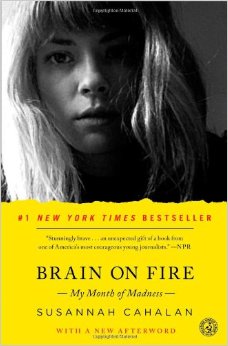 I just finished reading Brain on Fire: My Month of Madness which is a first-hand account of a young woman’s terrifying experience of an autoimmune disorder that attacks her brain. She is overtaken by seizures, hallucination, paranoia, and the realization that she is going mad.
I just finished reading Brain on Fire: My Month of Madness which is a first-hand account of a young woman’s terrifying experience of an autoimmune disorder that attacks her brain. She is overtaken by seizures, hallucination, paranoia, and the realization that she is going mad.
Susannah Cahalan’s memoir raises issues around misdiagnosed illnesses, the importance of personal advocacy and the need for a second opinion. She shows us the unconditional love of a supportive network of family and friends, gratitude for medical advances and the sobering reality that there is still so much we don’t know about why and how our bodies fail us. Callahan says:
[My illness] is a good reminder about how fragile our hold on sanity and health is and how much we are at the utter whim of our Brutus bodies, which will inevitably, one day, turn on us for good. I am a prisoner, as we all are. And with that realization comes an aching sense of vulnerability.
This is a quick read that invites us to be sympathetic to all who struggle to find diagnoses for their mental and/or physical suffering. Every member of my book club, myself included, agreed that this is a book worth recommending to others.
Has anyone else read this? What did you think?



